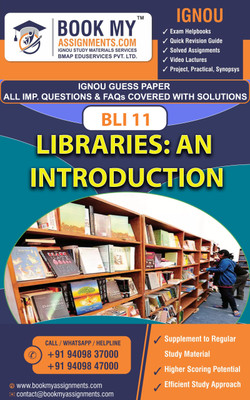IGNOU BLI 11 Libraries: An Introduction | Guess Paper | Important Question Answer |Certificate in Library and Information Science (CLIS)(Paperback, BMA Publication)
Quick Overview
Product Price Comparison
Introduction to Libraries:Define what a library is and its role in society.Discuss the historical development of libraries and their evolution over time.Explain the importance of libraries in preserving and disseminating knowledge.Types of Libraries:Describe different types of libraries, such as public libraries, academic libraries, school libraries, and special libraries.Discuss the unique characteristics and functions of each type of library.Library Collections:Explain the concept of a library collection and its components, including books, journals, multimedia materials, and digital resources.Discuss collection development policies and procedures, including selection, acquisition, and deselection of materials.Library Services:Discuss the various services offered by libraries, such as reference services, circulation services, interlibrary loan, and information literacy instruction.Explain the role of librarians in providing these services and assisting library users.Library Management:Describe the principles of library management, including planning, organizing, staffing, directing, and controlling.Discuss the functions of library administration, such as budgeting, personnel management, and strategic planning.Library Classification and Cataloging:Explain the importance of library classification and cataloging systems in organizing library collections.Discuss different classification systems, such as Dewey Decimal Classification (DDC) and Library of Congress Classification (LCC), and cataloging standards, such as MARC (Machine-Readable Cataloging).Information Sources and Services:Describe the various information sources available in libraries, including print materials, electronic databases, and online resources.Discuss reference sources and reference services, including bibliographic databases, encyclopedias, and online reference tools.Library Technology:Explain the role of technology in modern libraries, including library automation systems, digital libraries, and online catalogs.Discuss emerging technologies and their impact on library services and operations.Library Ethics and Intellectual Freedom:Discuss ethical issues in librarianship, such as censorship, privacy, copyright, and intellectual freedom.Explain the principles of intellectual freedom and the librarian's role in promoting access to information and freedom of expression.


